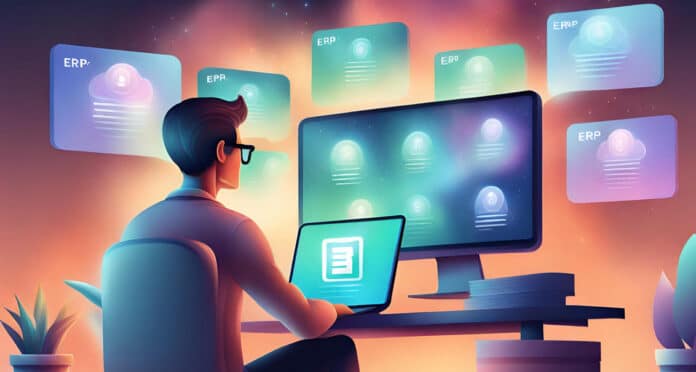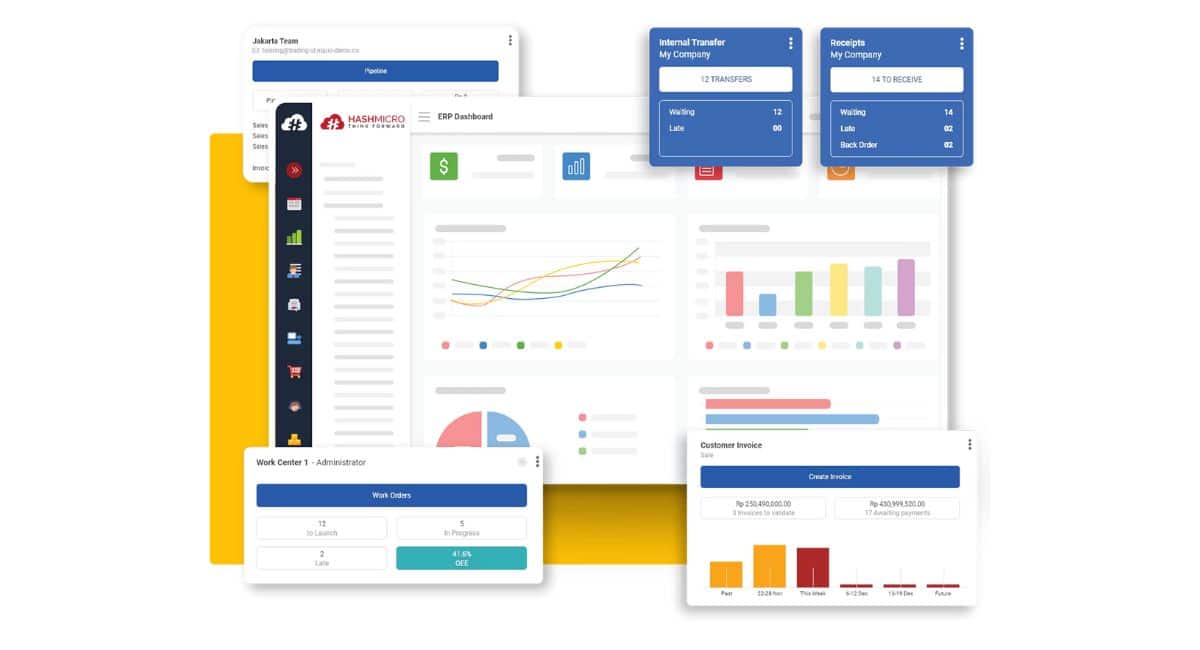aIn the rapidly evolving world of business technology, the debate between Cloud ERP vs. On-Premise ERP solutions remains a hot topic. Cloud ERP provides flexibility and scalability, while on-premise ERP offers greater control, customization, and security.
Both options offer unique advantages and cater to different business needs, so the choice is critical to streamlining operations and driving growth. Moreover, in fact, 80% of businesses already use at least one SaaS application.
But how do you determine which ERP solution best suits your business? Should you opt for the innovative and cost-effective Cloud ERP or stick with the tried-and-tested On-Premise ERP for its control and reliability?
This article will delve into the key differences, advantages, and considerations to help you make an informed decision. Join us as we explore the difference between Cloud ERP and On-Premise ERP, and discover which solution can elevate your business operations to the next level.
Key Takeaways
|
Table of Content:
Table of Content

What is Cloud ERP?
What is ERP? In general, ERP or Enterprise Resource Planning is a software solution to help companies or businesses with managing their operations. ERP systems come in several types, including cloud ERP.
Cloud ERP is a Software-as-a-Service (SaaS) solution that manages and integrates core business processes through Internet services. Hosted centrally in the cloud on vendor servers and accessed via a web browser, Cloud ERP provides scalability and flexibility, making it ideal for supporting remote work and team collaboration.
Additionally, Cloud ERP ensures automatic updates and maintenance are managed by the vendor, reducing the burden on internal IT teams and ensuring users always have access to the latest features and enhanced security. The system also offers robust disaster recovery and backup capabilities, protecting critical business data.
What is On-Premise ERP?
On-Premise ERP (Enterprise Resource Planning) is a software solution installed and operated on servers located within a company’s own facilities. Unlike Cloud ERP, which is hosted on a vendor’s server and accessed via the Internet, On-Premise ERP systems are managed by the company’s IT staff on-site at the physical location.
On-premise ERP systems offer several advantages, such as better data security, as the data is stored on the company’s own servers. They also allow the software to be customized to meet specific business needs and integrate seamlessly with other internal systems. On-premise ERP solutions are an option for companies with strict data security requirements or those who need a highly customized ERP solution.
The Pros and Cons of Cloud vs. On-Premise ERP
With the increasing popularity of ERP, many businesses are choosing between a cloud-based and an on-premise one. After all, this is a critical decision for businesses. While both options have their advantages and drawbacks, it is essential to weigh the pros and cons of cloud vs. on-premise ERP. This is to make an informed decision that fits your business’s unique needs.
Cloud ERP
When you hear the term ‘cloud,’ it means you’re talking about storing data and running applications from the internet, not from servers in your office.
This ERP system stores all its data and applications on a cloud server managed by the service provider, allowing users to access the system from anywhere as long as there’s an internet connection.
Imagine the ease of accessing all your office data and systems with just one click on your laptop or phone, without worrying about upgrades or other technical issues. This is at the core of what cloud-based ERPs offer: a solution that provides exceptional flexibility and efficiency in managing your business operations.
For further details about the cloud ERP itself, you can read here.
Advantages of Cloud-Based ERP System:
- Accessibility and Scalability: With a cloud-based ERP, you can access data and systems from anywhere, facilitating collaboration and work mobility. Moreover, as your business grows, you can easily increase capacity or features without experiencing downtime or lengthy processes.
- Automatic Updates: Like a tree growing and flourishing without needing your daily watering. Vendors routinely provide updates, keeping your system running smoothly without your direct involvement.
- Maintained Security: Consider this as a strong defense fortress for your data. Cloud providers usually come equipped with encryption and advanced security features to protect your data. Therefore, it’s crucial to ensure the extent of data security protection offered by your vendor.
- Customization Options: Many cloud-based ERP vendors (such as HashMicro, for example) offer modules that can be fully customized to fit business needs, along with the ability to integrate with various other systems, ensuring smooth and efficient business workflow.
Disadvantages of Cloud-Based ERP System:
- Requires Stable Internet Connection: Internet Connectivity Dependency: Despite offering access flexibility, without a stable internet connection, you might face difficulty accessing the system. This could hinder productivity in certain situations.
On-premise ERP
An on-premise ERP is a system model that you install directly on hardware and servers within your business environment.
Opting for an on-premise ERP can be an ideal solution, especially if your office is situated in an area with an unstable internet connection. This is because this type of ERP system features remote access, allowing you to access it from anywhere, even when the internet connection faces disruptions.
However, there are other aspects to consider before choosing this system. In the following explanation, we’ll outline the advantages and disadvantages of an on-premise ERP system so that you can make an informed decision that aligns with your business needs.
Advantages of On-Premise ERP System:
- Full Control: Companies have complete control over the entire ERP system, including data management, configuration, and security.
- Data Security: Since data is stored on your company’s server, you have full control over its security, including access policies and backups.
- Performance and Stability: Without reliance on internet connectivity, on-premise ERP systems typically offer reasonably good performance.
Disadvantages of On-Premise ERP System:
- Significant Investment Costs: Implementing this type of ERP requires a considerable initial investment for servers, along with the necessary hardware purchases. This means that the Return on Investment (ROI) tends to occur over a longer period.
- Risk of Data Loss: If the company’s local server encounters issues or if there’s an unstable internet connection, there’s a potential risk of data loss unless an effective backup system is in place.
- System Maintenance: You’re responsible for maintaining, updating, and troubleshooting the system, which requires an internal IT team or contracting with a third party. Additionally, making changes or upgrades to the system in the future might require additional investment and a lengthy process.
- Infrastructure Dependency: If there’s damage to your hardware or server, there’s potential for prolonged downtime until the issue is resolved.
For a pricing scheme of ERP software, you can click the image below.
The Difference Between On-Premise and Cloud ERP
When it comes to the best ERP software, one of the first decisions to make is whether to go with on-premise or cloud-based solutions. This requires careful consideration of various factors as it is not a one-size-fits-all decision.
Therefore as more and more businesses have come to utilize ERP, it is important to understand the fundamental differences between cloud ERP and on-premise ERP.
Cloud ERP operates by storing data and applications on a remote server managed by the service provider, enabling seamless access from anywhere with an internet connection.
Its hallmark lies in offering unparalleled flexibility and efficiency in managing business operations. Accessibility, scalability, automatic updates, robust security measures, and customizable options are among its key advantages.
Conversely, on-premise ERP involves installing the system directly onto in-house hardware and servers. It’s an optimal choice, particularly in areas with erratic internet connectivity, as it allows remote access even during disruptions.
Its advantages stem from full control over data, enhanced security measures, and stable performance due to independence from internet reliance. However, it incurs significant initial investment costs and demands dedicated resources for maintenance and upgrades.
Summary:
| Cloud ERP | On-Premise ERP |
| Data and applications are stored on remote servers. | Installed directly onto in-house hardware and servers. |
| Accessibility from anywhere with internet connectivity. | Accessible even in areas with unstable internet. |
| Provider-managed updates and system maintenance. | Requires dedicated in-house maintenance and updates. |
| Scalable with flexibility for increased capacity easily. | Limited scalability; capacity expansions involve hardware upgrades. |
| Relies on the provider’s security measures. | Offers enhanced data security through in-house control. |
| Pay-as-you-go subscription or usage-based pricing model. | Higher upfront costs due to server and hardware investments. |
Which One Should You Choose? Cloud ERP vs. On-Premise
Now that we know the difference between cloud ERP and on-premise ERP, which one is better? It depends on your business type and needs. Hence, you must also know when On-Premise is better than Cloud ERP and vice versa.
When On-Premise is Better than Cloud ERP?
While cloud ERP systems offer numerous benefits, such as accessibility and reduced IT infrastructure costs, there are scenarios where on-premise ERP systems may be a better fit for certain enterprises.
Large-scale enterprises, in particular, may prefer on-premise ERP systems as they provide complete control over their data. This total control is crucial for organizations with stringent data security and compliance requirements.
When Cloud ERP is Better than On-Premise?
When it comes to choosing between cloud ERP and on-premise ERP systems, cloud ERP often proves to be superior due to its inherent flexibility, reliability, and security. Cloud ERP eliminates the need for businesses to maintain and update their systems.
Instead, the cloud service provider handles these tasks, ensuring that the system is always up-to-date with the latest features and security patches. Thus, Cloud ERP has become increasingly popular in recent years due to its many benefits.
Cloud ERP vs On-Premise ERP Choosing Factors
Choosing between Cloud ERP and On-Premise ERP requires consideration of various important factors that can affect the performance and efficiency of your business. Here are the factors that should be considered in making this decision:
- Price: Cloud ERP typically has lower upfront costs and operates on a subscription model, while on-premise ERP requires a significant initial investment for hardware and software.
- Deployment speed: Cloud ERP can be deployed much faster, often within weeks, compared to on-premise ERP, which can take several months due to hardware setup and extensive customization.
- Safety: Cloud ERP providers offer robust security measures and compliance with international standards, whereas on-premise ERP allows for complete control over data security, which can be crucial for certain industries.
- Implementation: Cloud ERP has a more straightforward implementation process with standardized setups, whereas on-premise ERP involves complex and time-consuming customization to align with specific business processes.
- Updating and configuring the system: Cloud ERP systems are automatically updated by the provider, ensuring continuous access to the latest features. At the same time, on-premise ERP requires manual updates and configurations managed by the internal IT team.
Overall, Cloud ERP often delivers better performance than on-premise solutions, which can help businesses of all sizes and industries to streamline their operations, improve efficiency, and ultimately, grow their business.
The Best Cloud ERP for Your Business: Hash Core ERP
As there are so many cloud ERP vendors and providers, how do you choose the best one? Well, the most recommended cloud ERP in Singapore is HashMicro’s Hash Core ERP, trusted by over 1,750 businesses and companies from various industries.
It is a cloud-based ERP system that offers a comprehensive range of solutions including accounting, CRM, HRM, procurement, inventory, and more systems in one platform. The software allows for improved productivity and optimized business process operations.
With features like business process automation and easy access to data, users can make smarter decisions for their business’s growth. The system is also customizable to meet the unique needs of each industry and company.
Hash CORE ERP is designed to help businesses of all sizes automate various business processes with its modules and features. This cloud-based system is accessible anywhere, anytime, and with any device, making it easy to monitor end-to-end operational business activities.
Furthermore, one of the best cloud-based ERP solutions from Hashmicro, Hash CORE ERP has very reasonable prices. Companies can also receive funding for up to 70% of their digital solution adoption expenses by leveraging the CTC Grant. If you are still unsure about the system, you can also try out the demo of this cloud ERP for free.
Conclusion
To conclude, while each type of ERP has its differences with its own pros and cons, cloud ERP is more suggested to use. Other than it is more popular, cloud-based ERP is more beneficial.
One of the best examples of cloud-based ERPs is Hash CORE ERP, owned by HashMicro. Even before implementation, you can surely gain many benefits, such as free demo, CTC grants, and affordable prices. For consultations and more information regarding HashMicro’s cloud-based Hash CORE ERP, you can kindly click here or the image below.

























































